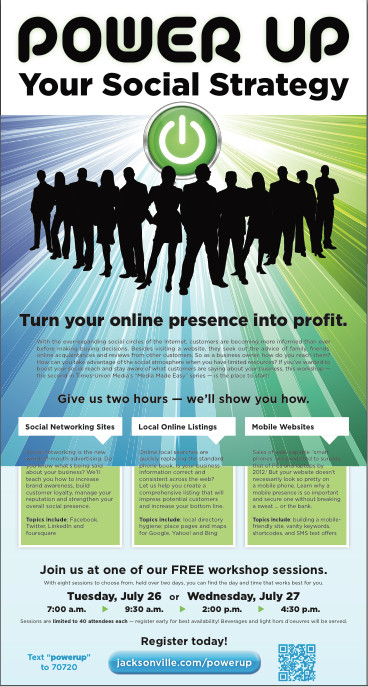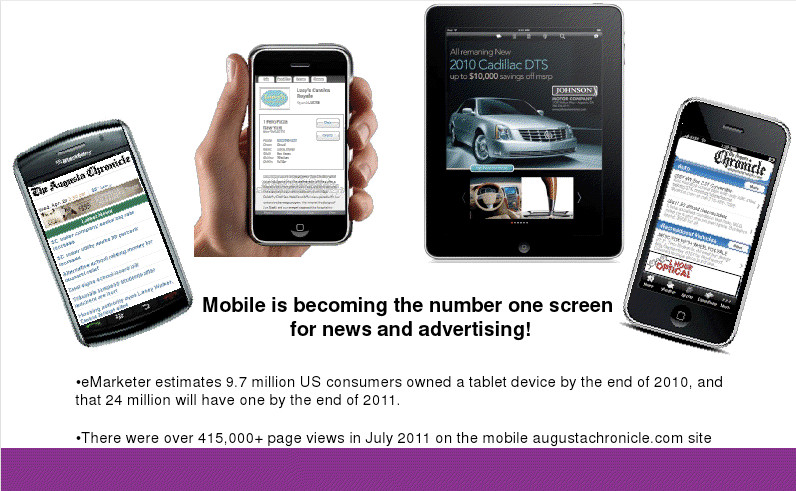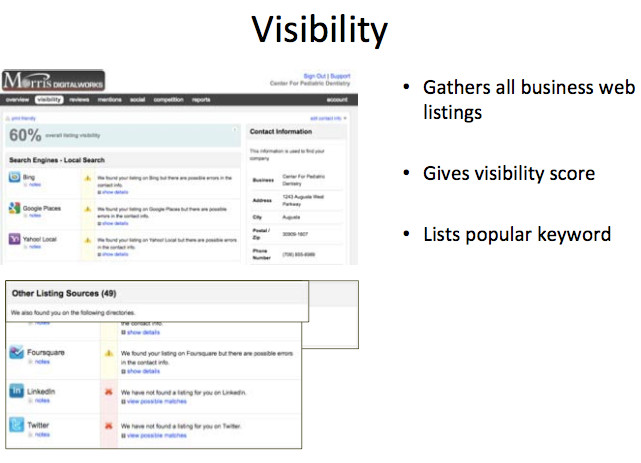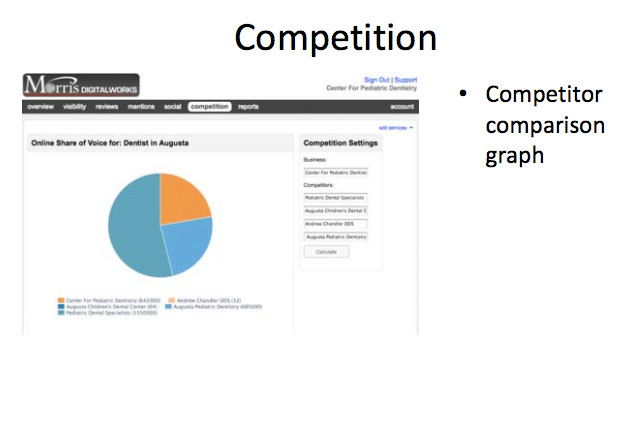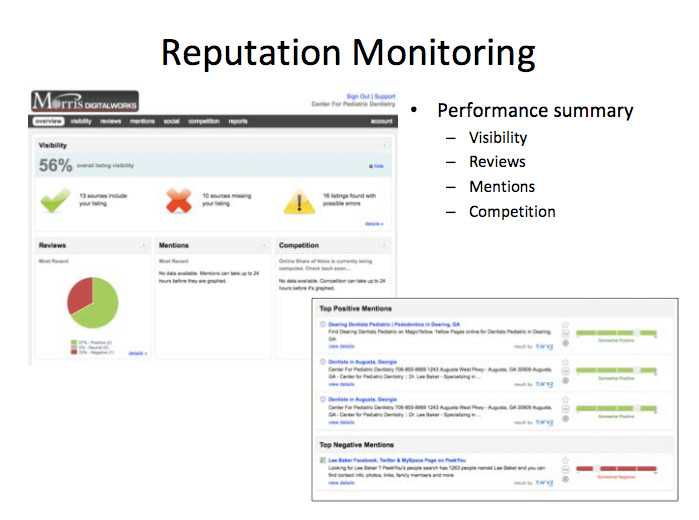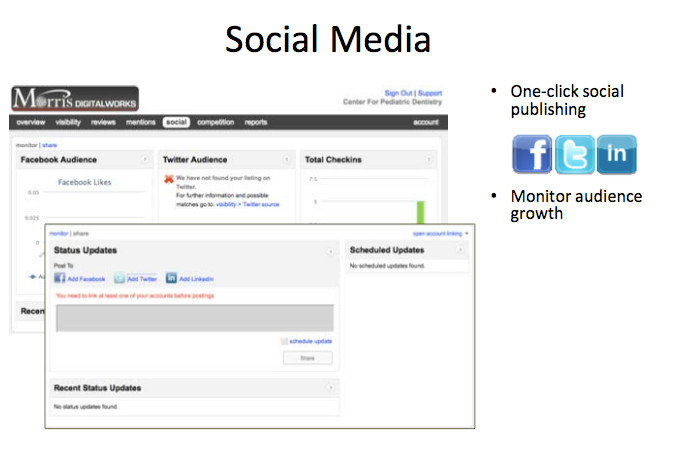SoLoMo packages sell what local merchants want
100 merchants sign up for digital marketing programs that include social, reputation management and SMS
Company: Morris Communications
Media: Florida Times Unions/Jacksonville.com
Key executives: Marc Jenkins, Digital Media Sales Director, Florida Times-Union; Dana Griffin, Director of Revenue Design and Development, Morris Communications; and Jodi Bell, Director of Advertising, and Gregory Hahn, Director of Digital Sales, Augusta Chronicle.
Initiative: SoLoMo (Social, Local, Mobile) media package
Summary: Local merchants prefer a single point of contact to help them with marketing - not just advertising. SoLoMo programs does just that. The programs provide social marketing, mobile solutions, SEO (directory-based) for one monthly price, with both a sales rep and customer service support. Jacksonville launched sales of SoLoMo programs in July, 2011. The new combo package subsequently launched in both Augusta and Savannah markets, with sales of around 100 merchants in the first few months.
Challenge: Create turnkey integrated marketing programs, including services for small business accounts that keep pace with the shift in consumer behavior towards social, search and mobile.
Strategy: Marc Jenkins, Digital Media Sales Director of Jacksonville.com developed the concept of SoLoMo packages and how to market them using advertising workshops. The programs add some new services (reputation management and text messaging) to products Morris already offered, such as SEO. Jenkins packaged and marketed them under a new "PowerUp" brand.
The pricing and packaging in each market is is slightly different, but the overall three part concept for SoLoMo - social, local and mobile - is the same. Prior to launch, Jenkins created an detailed roadmap which addressed the following key areas:
1. Products and services (including vendors)
2. Sales and Marketing
3. Pricing (a variety of levels)
4. Customer service
1. Products
The four basic services of SoLoMo programs include:
A. Social - The social component starts with custom Facebook pages, and placement in Foursquare, LinkedIn, and/or Twitter. Full service or "managed programs" also include marketing consults and a calendar of posting (each post automatically updates all social sites).
Another popular component is Reputation Management (also sold as a single $99 a month service); ie a dashboard the merchant can use to “monitor, review and respond” to mentions of their business on the web, a best practice for “turning complaints into customers.” Negative mentions are immediately auto-emailed to the merchants; positive reviews provided weekly.
“Managing your reputation is nothing new, every business has been doing it for as long as businesses have existed,” says Jodi Bell Ad Director at the Augusta Chronicle. The internet however, has created new challenges; to pitch the new product, Bell collected a sampling of comments about businesses in her market that hit page one of Google search rankings:
LOL. One time our waiter was so obviously high” Pizza company, Yelp, 5/28/11
Dirty little coffee house” 7.2 /11 Urban Spoon
The reputation management aspect immediately sparks local businesses' interest; some businesses use the service to monitor competitors. Others perceive it as an insurance policy.
The reputation management tools are white-labeled, and supplied by Vendasta. A number of competing local pure-plays also offer the service, however, building it into integrated program is perceived as a benefit. Merchants also prefer handing-off the set up and having a personal point of contact.
B. Local (SEO) - The local component starts with an upgraded "business profile page" in the local directory, - powered by local.com. The page is intended to increase SEO, although results admittedly vary segment by segment, depending on the competition, Jenkin says. This element of the program was pre-existing; Morris has sold directories and Google Adwords for years.
To beef up the SEO component, SoLoMo added a service to check merchants' posts on all local directories, via its white label partnership with Vendasta and with Yext.com.
"If they (small advertisers) have incorrect data on any portal, its a real hassle for them to get it fixed, and to submit corrections with the portals," Jenkins says. Using these tools, account managers check appearances in directories, identify opportunities and post them, which also helps, via link building, with SEO. Social media also boosts SEO, these components integrate well.
C. Mobile – The additional mobile component is a turn-key mobile site, use of a short code and key words for text campaigns. The merchants can "do it yourself," use a "dedicated expert" (the standalone price for this is also $99 a month) or layer in a mobile marketing campaign depending on the level of the package. "Only one or two have opted for self-serve," Bell says.
Augusta beta-tested SMS provider inSequent.com, a start-up with a good product "that needed some fine-tuning and polishing before we made it public-facing," says Jenkins.
Here are some well presents visuals on the new mobile site-as-a-service:
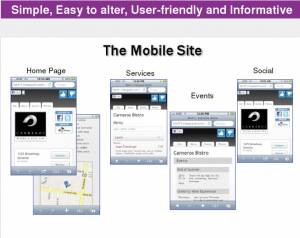
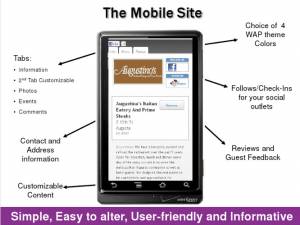
d. Media
Merchants can add online display advertising into the program as part of the packages. Print is not included, however, new merchants will receive a discount on print buys if they choose to do so.
2. Sales and Marketing
In Jacksonville, where The Florida Times Unions owns Jacksonville.com, Jenkins develped advertiser workshops to bring more small businesses into the program efficiently, and creating the "PowerUp" brand for the seminars. Seminars are now also rolling out in Augusta and Savannah.
"The pricing doesn't scale well by sending two feet out. When you look at financials with this sort of business model you need to bring down cost of acquisition," Jenkins says. He is looking at making the seminars part of "a continuing education series for small businesses."
Jenkins went out-of-house, using designer, Jen Hankey, JenHankey.com (she is available to work on media projects), to create the new brand. An image of the seminar invitation is included in the top right images (click to enlarge) and included full-size as an attachment. Digital ads were also designed in Flash to promote the seminar (also attached at the bottom of this document):





The Augusta Chronicle initially launched by upselling current customers on the packages, however is now adding seminars to the marketing mix.
3. Pricing
The sales packages are digital only, although new merchants in Jacksonville will get a set percentage discount on print. Pricing is also slightly different between markets. In Jacksonville, advertisers can buy components individually or package them for a discount and pay $500 a month. To have a service rep manage the program merchants can pay an additional $99 (In Augusts the managed program is built into the premium price). And there are three extra options for buying online display advertising. The SoLoMo brand helps make the four part integrated structure easier to understand. Here is the Jacksonville package:
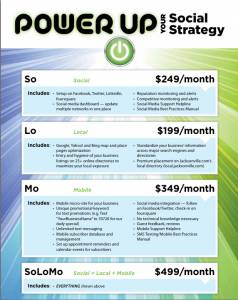
The next levels include managed programs and advertising:
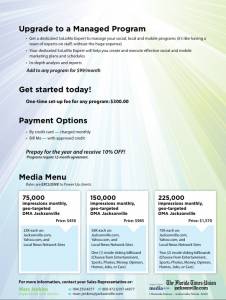
The Augusta three programs, "Starter," "Preferred," and "Power," are priced from $337 to $647 with the management built into the premium packages. All include an enhanced listing, referred to as a "business profile", reputation management, Facebook "Facelift", and mobile site, short code and 400 text messages. The "Preferred" and "Power" packages add additional text-messages and mobile advertising plus more services. The below Augusta pricing is for internal use, and is in the SoloMoPitchbook (attached in PDF at the bottom of this report). From the internal kick-off materials, here is the starter package at $337:
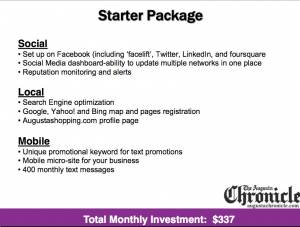
Pricing also took into account pure-play competitors selling reputation services in the market, including LocalEdge and Reputation.com, who charge $79 to $129 a month; hence the standalone price of $99. By bundling the services, the media packages provide more value; while meeting the needs of merchants for a single point of contact to manage complex marketing online. Vendasta's fee to the media company, per advertiser is just $10 a month and the main cost is in sales and customer service.
Package two ads adds a schedule of weekly social media posting (also $99 a month separate value) and additional text messages for $497 (although to send 1600 text messages a month require building a significant list of, say 400 opt-ins, first).
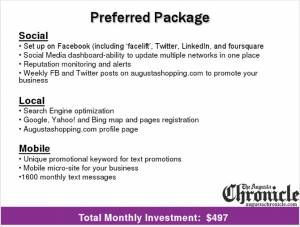
The third, "Power" package includes unlimited text messaging and 10,000 mobile display ads for $647:

4. Servicing the managed programs
Each merchant receives the initial set-up and training on tools and then "flies on their own" with access to an 800-number. The managed programs provide additional analysis and two to four hours of support per month, including set up of a posting calendar, and a monthly consultation to review reputation management issues and SMS targets.
Dana Griffin, a created position as Director of Revenue Design and Development at Morris, heads up the support team for Jacksonville.
"What we've found is that many of customers are looking for advice on using these tools and need help." Each support person manages about 20 merchants with the capacity to manage 30 to 60, using vendor-supplied backend tools that create automated reports.
"There is a level of work the customer has to do to make a social media program work for them," including responding to posts on their Facebook page, and engaging in writing SMS messages. She says the customers have not abused the service by calling too often, and that only one account has dropped because they felt support was insufficient.
Results
After launching in July, about 100 businesses have signed up. Sales were in Augusta were made by multi-media reps on outside calls (pre-seminar at this writing) while almost all of the new business in Jacksonville came from the workshops, and from following-up on the new pipeline created.
Jenkins says public-facing events produce categories are "allover the board" rather than the kind of targeting typical of most local media sales.
"It's a wild mix but it's a good one because new business development development actiivities typically have a low ratio of success. This is 'pull marketing'... We have to find better ways of finding peole to come to us; the need is already there, we just have to convince them...to find new and better ways to build that mousetrap."
He believes the future of programs like this is to continue to create pull-marketing programs via data-mining, online seminars and other marketing systems that pull small businesses into the funnel.
As of the end of October, 2011, Savannah, Ga. had just held its first workshop and Augusta was gearing up to host its first one as well.
Lessons learned
1. Third party vendors are powering more powerful solutions
None of these solutions would be available if Morris attempted to develop the technology on its own; clearly low cost partnering will be front and center of packing in the future (see resources below). "We do become eight legged vendor monstors," Jenkins says, but the benefits of the powerful reporting tools is well worth it.
2. Digital first replaced by digital only - reaching out to non-traditional advertisers
These packages jump past print and the .com sites to mobile display and social media, clearly a winning combination for local businesses and reaching much deeper into the market. However, as Jenkins points out, it is important to sell "programs not bundles" and at some point packages break down and merchants need customized solutions.
3. Price points and COS still to be resolved.
Both the cost of sales and the cost of service remains the biggest "X factor" for making these programs work.
4. The biggest problem in the managed program is obtaining phone time from merchants who signed up
Griffin notes that "of every thing we do our biggest challenge is not the tools and technology, its getting the businesses on the phone. During normal business hours a lot of businesses are running their business. We are running after-hour schedules with account managers who have flexible hours."
Our take
1. Add digital only sellers with an aim of $250,000 a year in contract sales
Once the infrastructure is built and servicing the monthly "consults" and calendar of updates is in place, we think the COS issue can be resolved by a new team of digital-only sellers, who can be additionally compensated (5 to 10% of the initial contract) for upsells to print or broadcast media, taking along a multi-media rep. A flat fee on sign-ups, override on continuing business, and percentage of the upsold contract is a model that will keep pure-play sellers communicating and working as a team with multi-media reps.
2. Pull-marketing is a great idea
Most local media companies - pureplay and established media - are terrible at B2B marketing systems. Terrible. As Jenkins notes, the only thing most media know how to to well is either a. send out sales people on one hand or b. collect checks from affiliate revenue. Investing in an outside designer to market the ad workshops was a key move for Jacksonville. We also like his concept of creating a series of ongoing education for merchants. We hope to see - and share - more innovation on this front.
Resources:
Designer, Jen Hankey, JenHankey.com
Mobile SMS and short code provider, inSequent
Reputation Management, Vendasta
Directory listing-check service, Yext
Directory powered by Local.com
NOTE: For the SoLoMo Pitchbook, please send an email to alisacromer@gmail.com
Many thanks to Marc Jenkins and Digital Advertising Sales Director at Jacksonville.com, Dana Griffin, Director of Revenue Design and Development, Morris Communications; and Jodi Bell, Director of Advertising, and Gregory Hahn, Director of Digital Sales, Augusta Chronicle for sharing their experiences with us, and to the Suburban Newspaper Association of America, for bringing this case study to our attention at the Fall 2011, Publishers and Advertisers summit.

The author, Alisa Cromer is publisher of a variety of online media, including LocalMediaInsider and MediaExecsTech, developed while on a fellowship with the Reynolds Journalism Institute and which has evolved into a leading marketing company for media technology start-ups. In 2017 she founded Worldstir.com, an online magazine, to showcases perspectives from around the world on new topic each month, translated from and to the top five languages in the world.

